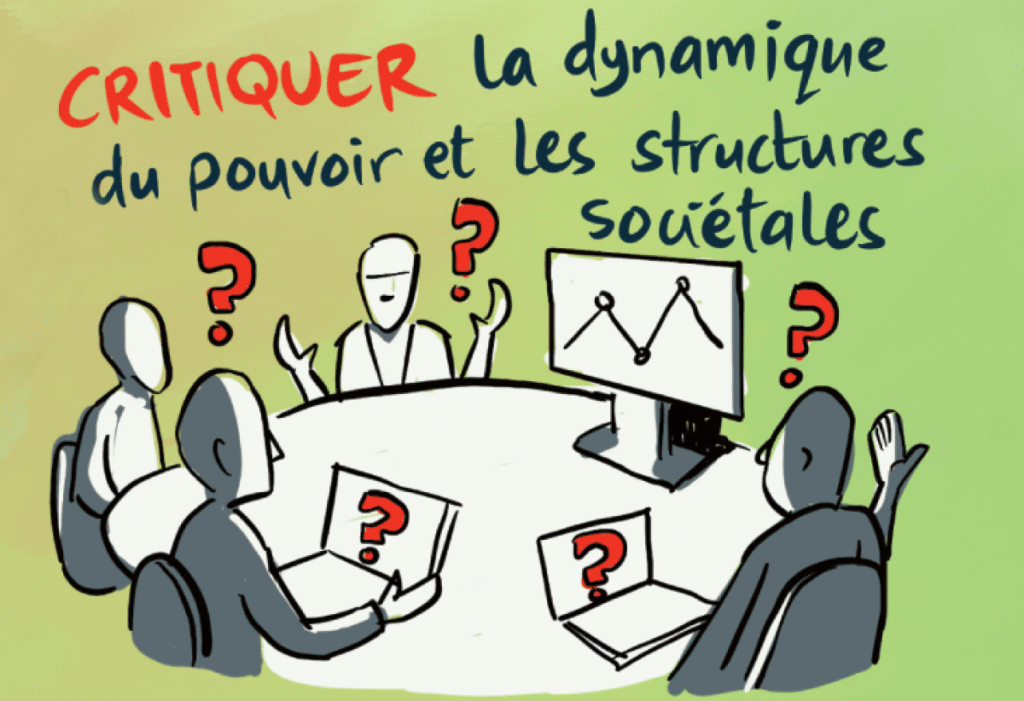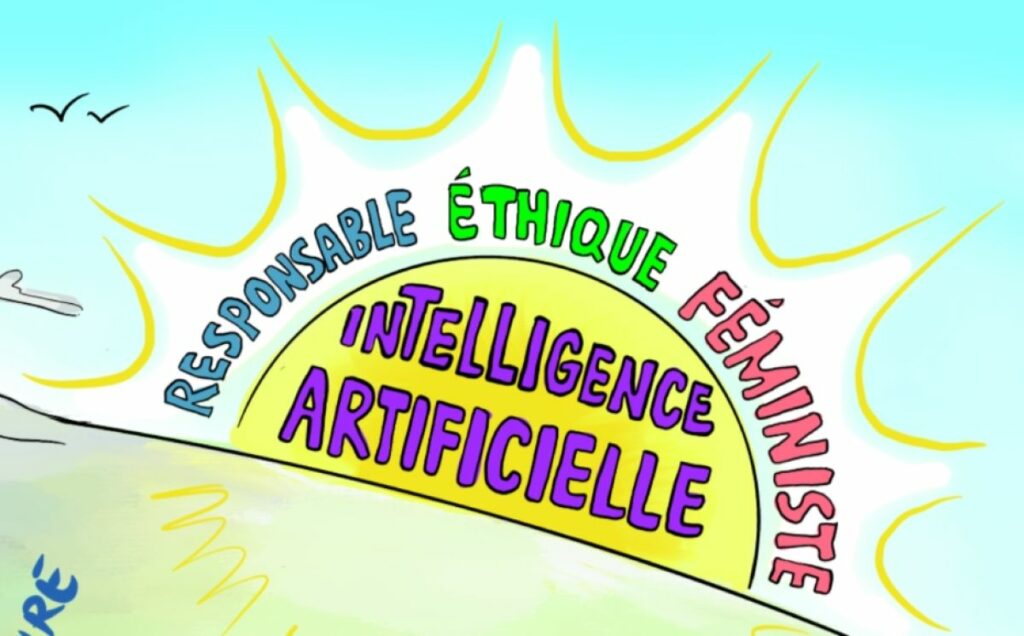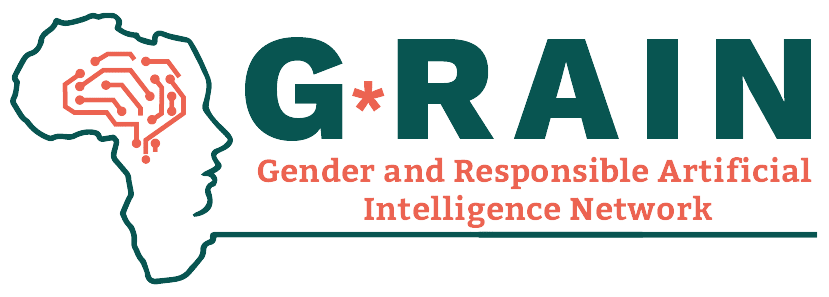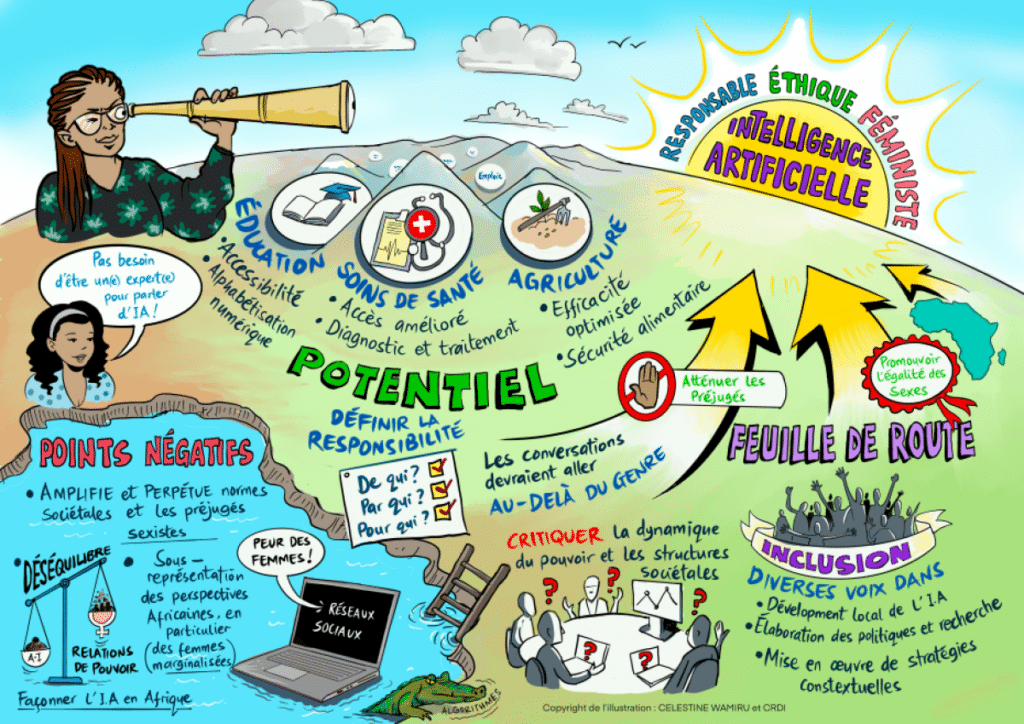The illustration gives an overview of the Café's discussions on gender and highlights the main areas discussed: the potential of AI, its negative effects and some recommendations.
Members of the artificial intelligence (AI) community in East Africa say there is an urgent need for ethical considerations, feminist approaches, and inclusive African policies and strategies in the development and implementation of AI on the continent. These are just some of the recommendations from a Gender Café, entitled "Responsible, Ethical and Feminist AI for Development", co-hosted by Global Affairs Canada and IDRC in Nairobi in March 2024. At the event, a panel of experts, practitioners, policymakers, and Nairobi-based researchers, many of whom are supported by IDRC, explored how AI technologies bring progress and innovation, but also pose significant challenges and risks, particularly in relation to gender disparities and inclusion.
Key facts
- AI will initially take on roles in areas such as customer service and human resources, which are mainly occupied by women.
- Those interviewed as part of the AI deployment research expressed fear about what it means for their work.
- Employers were optimistic about the use of AI in the workplace.
Impact of AI on women's employment
The International Labour Organisation estimates that AI could displace 3.7 % of all female jobs worldwide, or 48 million jobs. This compares with a loss of 1.4 % for men. IDRC-funded research conducted by Strathmore University's Center for Intellectual Property and Information Technology Law (CIPIT) on the banking sector in Kenya found that AI would first take over areas such as customer service and human resources, which are predominantly held by women. The research project also looked at people's attitudes to the potential changes. "There was a lot of fear among those interviewed about the deployment of AI and what it would mean for their jobs. But on the employer side, it was [the reaction] a positive thing: [they thought] I'll use AI and everything will be fine," noted one person involved in the research.
Café attendees also discussed how AI systems that feed data reinforce gender biases. For example, when people reinforce negative stereotypes ("all women love money") in social media, that digital information is fed into the AI learning process, which affects the way AI systems understand gender, perpetuating and even normalising stereotypes and prejudices.

Inclusion in AI development: How do we address issues of power relations?
The lack of representation of women and marginalised groups in AI development and decision-making processes has been identified as a critical issue. The AI and technology industries are predominantly led by middle-class men. This hierarchy leaves marginalised groups, particularly African women, with limited influence and access to AI development.
Another challenge raised was the predominance of "colonial models" of AI, which are not designed to understand or incorporate indigenous African perspectives or models. An expert in socio-technical systems and AI ethics stressed that true inclusion goes beyond mere digital representation. "Ideally, we should be asking ourselves the following questions: How do we address issues of power relationships? Who has the money? Who has the expertise? Who designs what? Who is shaping these perspectives and whose political and corporate interests are we defending?

"You don't need to be an expert to talk about AI, because if you are, the global majority won't be able to sit at the table as, by design, the right seat or the right seat for tech is [San] Francisco, it's China or Dublin," noted one attendee. She said the democratisation of AI discussions ensures that a wider range of views, particularly from under-represented groups, can influence the development and application of AI, making it more equitable and reflective of global diversity.
AI policies and strategies in Africa: Africans first
Countries such as Kenya, Egypt, Mauritius, Rwanda and Senegal are developing AI policies with growing recognition of its importance across the continent. The African Union is also developing a continental AI policy roadmap, with support from IDRC among other development partners. Café attendees welcomed the development of a strategy, but stressed that it should be guided by a clear understanding of the specific goals, challenges and opportunities that AI presents in the African context.
One panellist warned of the possibility of the "Brussels effect", where EU regulations influence global standards due to the requirements of trading relationships with the EU. She noted that African countries are often under pressure to align with global AI regulations, such as the General Data Protection Regulation, which do not necessarily match Africa's community considerations and do not recognise the nuances of marginalised communities. This highlights the importance of adapting AI policies to local realities.
She added that the deployment of technology, including AI, is inherently political, with the potential to reflect and reinforce the political will of those in power. Therefore, the development of AI policies and strategies in Africa requires careful consideration of the political landscape to ensure that these technologies benefit society as a whole.
In Kenya, for example, existing laws barely address AI, with little or no mention of gender considerations. The rejection of a robotics and AI bill by AI experts due to the lack of female representation highlights a significant gap in the development of gender-inclusive AI policies. In addition, the absence of AI in educational curricula and the lack of a comprehensive AI policy point to areas in need of urgent attention.

Those invited to speak also stressed the importance of inclusive global conversations in the development of AI strategies, underlining the need for the voices of countries in the South, particularly Africa, to be heard.
Here are some of the recommendations that emerged from the discussion:
Foster inclusive policymaking by ensuring that AI policymaking processes involve diverse stakeholders from various economic, social and cultural backgrounds. For global policies, particular attention should be paid to the inclusion of voices from the Global South and marginalised communities to ensure that AI strategies are equitable and reflect diverse needs.
Address bias in AI through platforms and forums to specifically address and mitigate social bias in the development and use of AI. This includes gender bias, ensuring that AI technologies do not perpetuate existing inequalities, but rather contribute to gender equality.
Review and update legal frameworks, particularly in countries such as Kenya, where existing laws do not reflect the current technological landscape.
Improve AI education and awareness by integrating AI into curricula at all levels to develop a fundamental understanding of AI among students.
Promote local AI research and development initiatives as the best way to ensure that AI solutions are tailored to meet the specific needs of the population.
Actively work towards gender inclusion in AI development teams, policy forums and research initiatives.
This article is based on a Gender Café jointly organised by IDRC's Eastern and Southern Africa Regional Office and the Canadian High Commission in Nairobi on 15 February 2024, with contributions from panellists Angella Ndaka (expert in socio-technical systems and AI ethics), Nanjira Sambuli (expert in technology, public policy and global governance), Melissa Omino (expert in intellectual property), Irene Mwendwa (expert in human rights and technology policy) and other participants.
Contributors: Loise Ochanda, Program Administrator, IDRC, with Elizabeth Muriithi, Regional Advisor, IDRC, Betsy Muriithi, recipient of a professional development grant, IDRC, and Kagure Wakaba (gender specialist).
Not that long ago, people lived and functioned in tight communities. Every vendor knew their customers personally and could make...
This Machine Learning Glossary aims to briefly introduce the most important Machine Learning terms - both for the commercially and...





